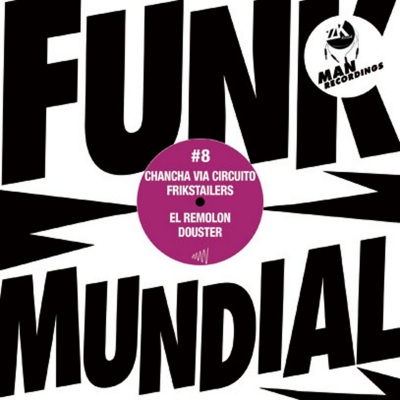
Funk Mundial #8
For its 8th installment, the Funk Mundial series temporarily moves to Buenos Aires, Argentinia to present what is quite possibly the first ever Baile Funk Cumbia record to be released. Yes, we’re talking about a world premiere here: The two music styles that recently put South America on the DJ radar again, are melting together in Funk Mundial #8: Baile Funk meets Cumbia. For this volume, four of the hottest producers of Buenos Aires digi-cumbia label ZZK teamed up with various Baile Funk Mcs from Rio De Janeiro. ZZK is to cumbia what Man Recordings is to baile funk – mixing up one raw, regional music style with the best of various genres to create a unique new sound. Founded as a label in 2008, ZZK broke internationally with their mixtapes, in which cumbia – the traditional pan-latin-american dancehall sound – was mixed up with reggaeton, hip hop and various forms of bass music. Recently, the label released its first compilation and full artist albums. Frikstailers are followed by El Remolón, who hails from Buenos Aires and is one of the big whizkids in the digital cumbia revolution. His collaboration brings MC Marina from Rio De Janeiro en pair with the Autotune effect resulting in the light and irie „Vem Que Tem“. Track three is by Douster and is a hip shaking cumbia-baile-reggaeton track „Puta Que Paria“ features Rio based MC Dandão, who was already featured in the legedary „Soca Ali Baba“ on Funk Mundial #3 by Crookers. The EP closes with a great, deep contribution by Chancha Via Circuito, another young talent from the ZZK camp. With his feature of MC Pretinho on „Buçetão“ (meaning „Pussy“) he created a stunning tune that is soulful in vybe, explicit in lyrcis and fresh with a sharp half-time double-time rhythm architecture that breaks up the slow mo cumbia groove into a rocking stomper. Funk Mundial #8: A stunning new release in the acclaimed Man Recordings series, presenting the first ever Cumbia-Baile Funk blends on vinyl. And at the same time it’s one of the first ever Brazilian-Argentinan music cooperation in today’s electronic music. Maybe the sound of both Rio and Buenos Aires, two of South America’s prime cities had to move to a Berlin label first, to come together?
